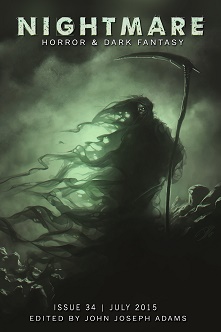Reviewed by Lillian Csernica
“Wolves and Witches and Bears” by Alison Littlewood
Nick and Ella go to Croatia for a vacation. Their relationship isn’t what it used to be, so Ella is hoping the getaway will bring them closer together. Ella’s observations about Nick reveal the many little ways in which he proves himself to be a domineering control freak. This becomes all the more apparent when he insists they go for a walk through the dense, unfamiliar forest on trails that require a map and a compass. One of the modern perils of the Croatian countryside leaves Nick in the position of depending on Ella for rescue. Ella is eager to prove herself competent and reliable, worthy of Nick’s love and respect.
If I was a casual reader, I would not have read on past the first few paragraphs of this story. Any sympathy I might have felt for Ella is canceled out by her willingness to keep being treated badly by Nick as she tries to win some sign of approval. Nick deliberately disregards the well-known and clearly designated dangers of rural Croatia. The events of the story are harrowing and would test any character’s mettle. Nick gets what he deserves, but that’s not satisfying because Ella has no real character arc. If anything, by the end of the story she has confirmed Nick’s opinion of her. “Wolves and Witches and Bears” would have benefited from more of all three.
“The Cork Won’t Stay” by Nate Southard
The male protagonist along with other family members watches his father draw his final breath. The loss hits the protagonist hard, driving him to seek refuge in beer. A lot of beer. For anyone else this might be risky behavior. For the protagonist it is a form of self-medication, helping him deal with the grief along with blunting his thought processes enough to keep everyone else around him out of danger. Well, almost everyone.
The protagonist’s grief feels genuine. His anxiety over the possible loss of self-control makes him likable. He does what he can to deal with his pain and keep himself away from people. What happens next is not really his fault, yet the depth of his regret is touching. The story works just fine, right up until the twist at the end. That ruins the emotional resonance of memorial service for the protagonist’s father. While what happens is consistent with the protagonist’s characterization, it struck me as being completely unnecessary.
 Nightmare
Nightmare